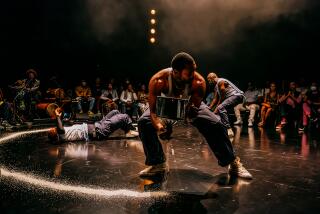Review: Tug-of-war for a soul in ‘The Brothers Size’
SAN DIEGO — “The Brothers Size,” now at the Old Globe, is part of Tarell Alvin McCraney’s “The Brother/Sister Plays,” a trilogy that includes “In the Red and Brown Water,” which is concluding its acclaimed run this month at the Fountain Theatre.
These lyrical works, infused with New World versions of West African Yoruba mythology, Gulf Coast humidity and classic R&B;, grow in stature when experienced in proximity.
Directed with sensitive clarity by Tea Alagic, who was a close collaborator of McCraney’s in their student days at the Yale School of Drama, this Old Globe production of “The Brothers Size” has a simplicity that quietly ripples outward into an emotional grandness.
PHOTOS: Arts & culture by The Times
Three actors and a percussionist occupy a spare stage upon which a circle has been drawn in sand. Voice and movement are stylized in a work that occasionally speaks its own stage directions. McCraney makes poetry not just out of words but out of rhythm, gesture and breath.
The characters’ odd names — Ogun Henri Size (Joshua Elijah Reese), Oshoosi Size (Okieriete Onaodowan) and Elegba (Antwayn Hopper) — derive from Yoruba deities or orishas. This is fitting for a drama that is more interested in archetypal patterns than intricate plotting.
As with “In the Red and Brown Water,” “The Brothers Size” is set in San Pere, La., and involves a rivalry for affection, with a vulnerable character torn between safe and steady and dangerous and exciting. And once again the mature and responsible choice is at a decided disadvantage, for lurking perpetually in the shadows is the temptation of a destructive joy ride.
Oshoosi has just been released from prison and has come to live with his older brother, Ogun. The siblings could hardly be less alike. Ogun, a mechanic who owns his own garage, is all work and no play. He seems to have sublimated his sadness over losing Oya (the protagonist of “In the Red and Brown Water”) into fixing cars. He has little patience for Oshoosi’s sloth and demands that he help him out at his shop if he’s going to live in his home.
Oshoosi, who doesn’t want to become a grease monkey, resents Ogun’s bossiness. The last thing he needs is another warden. He wants to chase girls outside the movie theater with his friend Elegba, who was in jail with him and floats in and out of his company like a breeze from the nearby bayou.
IN CASE YOU MISSED IT: GRAMMYS 2013 | Show highlights | Winners and nominees | Quotes | Best & worst dressed
Elegba’s attachment to Oshoosi has a sly, mischievous quality. He praises Oshoosi for his singing voice (“You ope up your mouth an everybody know where the pain at”), conjures up a car for his use and stakes a claim for the two being “brothers in need.”
Indeed, Elegba — whose name invokes the orisha known as “the trickster” or “teacher of difficult lessons,” as a program note informs us — seems determined to steal Oshoosi from Ogun and ensnare his affection and dependency. A contest ensues for Oshoosi’s soul, and in this struggle the meaning of true brotherhood is clarified.
There’s a lot of talk about women, but the homoeroticism is just as prominent. Yet the play is ultimately more interested in love than sex, more caught up in the pairing of souls than in the pull of bodies.
There’s a naked tenderness to McCraney’s characters, an ache for security in an insecure world, in which illness can make a mother disappear and law and order can seem more threatening than chaos.
“In the Red and Brown Water” was dedicated by the author to his “sisters”; “The Brothers Size” is dedicated to his “brothers” — to which McCraney appends the word “all.” And there is the sense of the playwright working out in theatrical form the relationships of men, black men, who feel more than they can say, whose song, if they could give full voice to it, would sound as heartbroken and suffused with longing as Oshoosi’s prison blues.
Hopper’s Elegba wanders the stage with his shirt off, his eyes making clear that Oshoosi is his prize. Onaodowan’s Oshoosi conveys boisterous free-spirited youth careening toward another wall. Reese’s Ogun is rock solid but too human to be made of stone.
Alagic’s production, animated yet never overwhelmed by percussionist Jonathan Melville Pratt’s accompaniment, is straightforwardly at the service of the writing. It doesn’t want to obstruct McCraney’s vision, but it’s also a tad timid, afraid perhaps of putting auteur fingerprints on the work.
The play’s affecting voice majestically comes through, but it will be interesting to see when “The Brothers Size” inevitably makes its way to L.A. whether a director with a freer hand can take the poetic intensity to an even dreamier level.
--------------------------------------
‘The Brothers Size’
Where: The Old Globe, Balboa Park, San Diego
When: 7 p.m. Tue.-Wed., 8 p.m. Thu.-Fri., 2 and 8 p.m. Sat., 2 and 7 p.m. Sun. Ends Feb. 24.
Tickets: Start at $29
Contact: (619) 234-5623 or https://www.theoldglobe.org
Running time: 1 hour, 30 minutes
MORE
INTERACTIVE: Christopher Hawthorne’s On the Boulevards
VOTE: What’s the best version of ‘O Holy Night’?
PHOTOS: Arts and culture in pictures
More to Read
The biggest entertainment stories
Get our big stories about Hollywood, film, television, music, arts, culture and more right in your inbox as soon as they publish.
You may occasionally receive promotional content from the Los Angeles Times.











